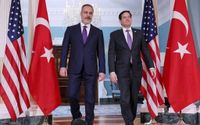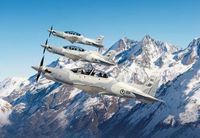In a significant development for Swiss defense capabilities, Lockheed Martin has entered into an agreement with Pilatus Aircraft to enhance pilot training systems tailored for fifth-generation aircraft, particularly the F-35. This collaboration comes as part of Switzerland's commitment to bolster its military training infrastructure, ensuring that pilots are better prepared for modern warfare.
Under the terms of the agreement, Lockheed Martin will provide data and support to Pilatus, enabling the development of bespoke avionics and training functionalities. This new training system is expected to greatly benefit air forces operating the F-35, allowing for more effective preparation of pilots for frontline missions. “We are delighted to have the support of armasuisse and Lockheed Martin. This technology transfer is a win-win situation for all three parties, and for Switzerland,” remarked Markus Bucher, CEO of Pilatus.
The project has received the endorsement of the Swiss Federal Office for Defence Procurement, known as armasuisse, which approved the offset initiative in early 2024. This initiative is part of Switzerland’s broader agreement to procure the F-35A, which includes a commitment from Lockheed Martin to deliver industrial offset projects valued at 60 percent of the contract's total worth.
Urs Loher, Director of armasuisse, emphasized the importance of this industrial cooperation, stating, “It makes a significant contribution to strengthening our security-relevant technology and industry base. It promotes sustainable innovation, technological development, and the competitiveness of Swiss industry, which directly benefits national security.” The training system being developed will be based on the PC-21 platform, Pilatus’s high-performance turboprop trainer.
The PC-21 is designed to simulate the experience of flying advanced jet aircraft, utilizing embedded systems and cockpit layouts that closely mirror those found in fifth-generation fighters. As modern air forces face increasing demands, the PC-21 offers a cost-effective and capable solution for preparing military pilots. Its innovative training concept allows armed forces to produce mission-ready pilots while reducing reliance on expensive jet trainer hours.
Meanwhile, the situation regarding the potential lifting of sanctions on Turkey and the sale of F-35 fighter jets to Ankara remains uncertain. In recent developments, conflicting predictions have emerged from Washington regarding the sanctions imposed under the Countering America’s Adversaries Through Sanctions Act (CAATSA) and the ongoing negotiations surrounding the fighter jet sale.
Sources indicate that efforts are underway to explore pathways for waiving the sanctions; however, significant resistance is forming within the US government. President Donald Trump is expected to receive a briefing from the State Department this week on the matter. This follows a brief phone call with Turkish President Recep Tayyip Erdogan, which reportedly lasted just seven minutes, contrary to the Turkish presidency's characterization of the conversation as extensive.
Several factors contribute to the hesitancy within the US administration, including Turkey’s support for Hamas and recent developments surrounding the arrest of Istanbul Mayor Ekrem Imamoglu. The most influential factor influencing the administration's stance appears to be Israel. Trump had previously reassured Israeli Prime Minister Benjamin Netanyahu that the sale of F-35s to Turkey was not under consideration during their recent meeting in Washington.
This commitment had initially eased concerns within Israeli diplomatic circles and among the pro-Israel lobby in the United States. However, the revival of the F-35 issue has reignited opposition, with Netanyahu personally expressing concerns to US Secretary of State Marco Rubio. Israeli officials argue that Turkey’s involvement in Syria places it effectively on Israel’s border, and providing Ankara with advanced American military technology could pose a significant national security risk.
Given the broader regional implications, this argument is one that the White House cannot easily overlook, especially at this critical juncture. Ultimately, the final decision rests with Trump, who acknowledged Erdogan's requests but has yet to commit to any specific actions. Turkish Foreign Minister Hakan Fidan has also reiterated Ankara’s position during meetings at the State Department, emphasizing the need for a reset in US-Turkey relations, particularly through enhanced defense cooperation, which would require lifting sanctions and restrictions on military technology sales.
The evolving dynamics surrounding both the Swiss training system and the US-Turkey F-35 negotiations underscore the intricate balance of international defense relationships. As nations navigate these complex waters, the outcomes of such agreements will likely have lasting implications for global security and military readiness.






